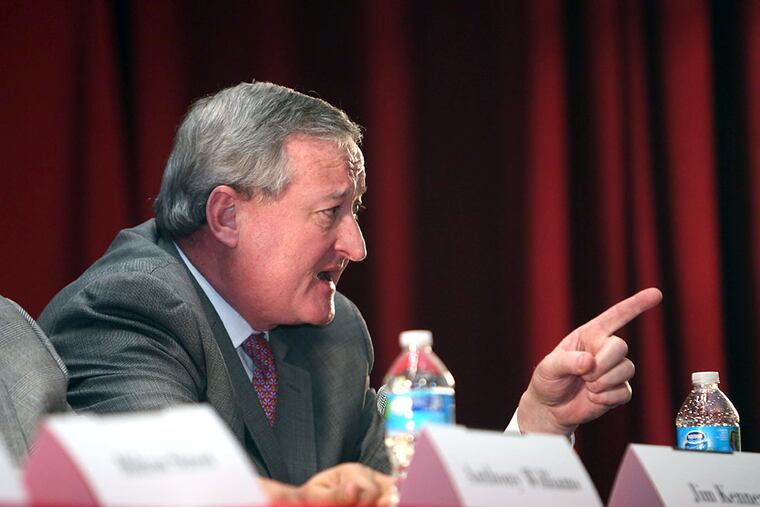Kenney & unions: Can he say 'No'?
Organized labor bedrock of the citys Democratic establishment backs Kenney. But can he say no to them if hes elected?

IT WAS A CHILLY end-of-winter night when Jim Kenney appeared before a crowd of about 400 Society Hill residents who filled an auditorium at Pennsylvania Hospital to hear the candidates for mayor speak.
It was a classic (read: liberal) Center City crowd. White, affluent, active voters, generous givers to campaigns and - at this point in the game - mostly undecided. They were appraising each candidate and judging them on two criteria: Is this someone whose views roughly coincide with mine? Is this someone who can win?
Kenney was pitch-perfect, displaying a fine balance between passionate lover of the city and policy wonk. When Kenney talks about policy, you know he is not just mouthing the words. He's been in politics and elected office most of his adult life, immersed in the issues of the day. He knows his stuff.
Kenney is selling himself as a bridge candidate, with one foot in rowhouse Philadelphia and another in the world of the new Philadelphia. He comes across as the perfect model of a progressive, modern, forward-looking urban candidate.
With one notable exception.
Kenney is unioned-up. So far, he has won the support of the teachers union, the firefighters, the FOP, the AFL-CIO and John Dougherty's IBEW. Soon to come, in all probability, will be the two large municipal-employees unions: blue-collar District Council 33 and white-collar DC47.
It's not unanimous - Anthony Hardy Williams has also gotten a share of labor support - but Kenney has the most. He also has the unions with the most money to spend, directly to his campaign and indirectly, through SuperPACs.
Another way to put it is that Kenney is the candidate of the Establishment. In olden days that meant the Waspy bankers, businessmen and the wealthy who dominated politics from the Union League. Those times are long gone.
In Philadelphia today, the labor unions are the Establishment. As such, they are conservative - not in a superficial political way, but in the sense that they are against change. Collectively, they don't want a new city. The old one works just fine - for them.
For all the advantages they bring, the unions are an expensive date. They have their wants and needs.
The building trades, for instance, want a mayor who will help maintain their near-monopoly over construction in the city. That means no work done by nonunion workers.
The teachers union wants to make the world go away. No new charters. No work-rule changes. No benefits cuts. And, above all, an end to the School Reform Commission and its attempt to end selection-by-seniority in the schools.
The city unions have disparate agendas but unite in a desire for increased wages. There's a pent-up demand for higher wages after the lean years of the recession. Now that a recovery is underway, it is time to go for more money.
Taken one by one, these are just and reasonable goals. Labor leaders, after all, were elected to represent the interests of their members and they want what we all want: a good wage, decent benefits and guarantees that you won't be fired for looking cross-eyed at a supervisor.
But what happens when those goals conflict with the broader needs of the city?
Does support for the trades monopoly on construction hurt our ability to grow? The assertion that we have New York building costs but can only charge Baltimore rents is true. And don't most of these jobs go to racially and gender-challenged unions, most of whose members live in the suburbs? We know what the unions get out of the deal, but what about the rest of us?
Does the desire of the teachers to protect their existing contract and benefits conflict with the broader needs of a school district that is in economic distress? And what about Superintendent William Hite's desire to make the district schools competitive by giving principals the power to hire and fire without relying on seniority?
The city unions want better wages and health benefits and to maintain the pension system as we know it - even with its $5 billion deficit. The central motif of city government for more than a decade has been to sacrifice the capacity to deliver services to the ever-growing cost of fringe benefits. Can you help a city worker without harming the average city resident, who makes $36,000 a year and has mediocre health benefits and no pension?
A mayor has to balance these interests, with an eye on the greater good. To put it another way, a mayor has to say "No."
The central question of a Kenney candidacy doesn't deal with his personality or his experience. It hinges on his ability to say "No."
If he can't say "No" to the Establishment, then we will have a city where the powers that be will be happy indeed, but we may not have a city that is economically competitive, with successful public schools or strong city services.
In Philadelphia, our past is always at war with our future. So, this final question: Is Jim Kenney the candidate of the future or is he the candidate of the past?